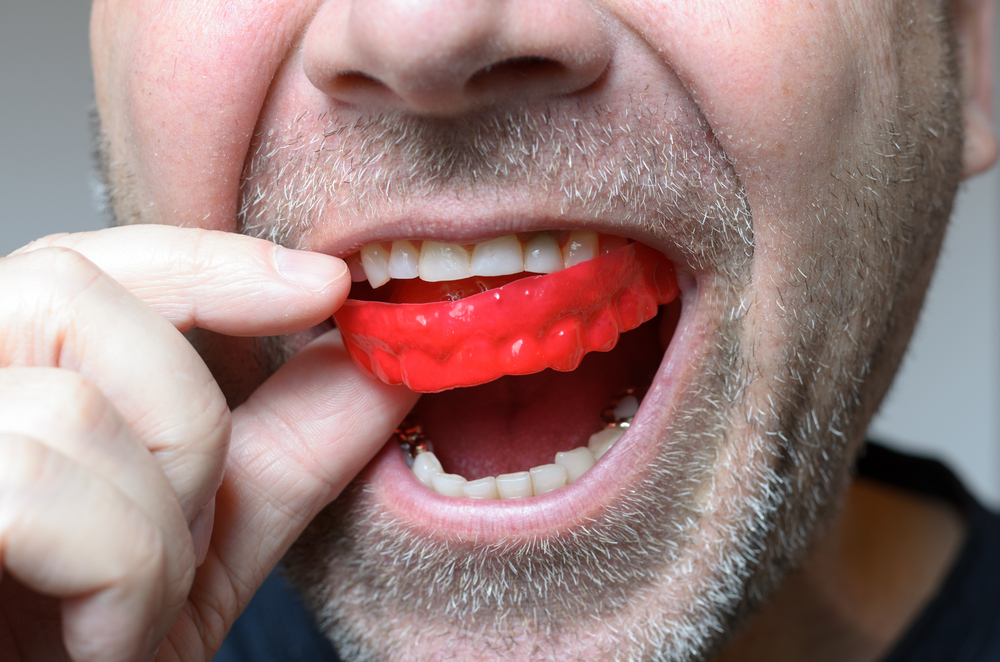Temporomandibular joint (TMJ) disorders can be a source of persistent discomfort for many individuals. These disorders affect the joints that connect your jaw to your skull and can result in symptoms like jaw pain, headaches, and difficulty chewing.
One potential remedy for managing TMJ disorders is the use of mouth guards. In this article, we will explore the link between TMJ disorders and mouthguards, examining how these dental appliances can play a role in alleviating symptoms and promoting overall oral health.
The Basics of TMJ Disorders
Before delving into the connection with mouthguards in Sherwood Park, let’s briefly understand what TMJ disorders entail. The temporomandibular joint functions like a sliding hinge, connecting your jawbone to your skull.
When this joint is impaired, it can lead to a range of symptoms collectively known as TMJ disorders. These may include jaw pain, clicking or popping sounds when opening or closing the mouth, headaches, and difficulty chewing or even fully opening the mouth.
Causes of TMJ Disorders
TMJ disorders can arise from various factors, including jaw injuries, arthritis, or excessive teeth grinding and clenching, known as bruxism. Stress and anxiety can also contribute to the development or exacerbation of TMJ symptoms.
Identifying the root cause is crucial to determining an effective treatment plan.
The Role of Mouth Guards
Mouth guards, also known as dental splints or occlusal splints, are custom-fitted devices made of soft or hard materials. They are commonly used to protect teeth from the effects of bruxism and reduce tension in the jaw muscles.
When it comes to TMJ disorders, mouthguards can serve multiple purposes:
- Nighttime Teeth Grinding (Bruxism): Many individuals with TMJ disorders also experience bruxism, especially during sleep. The constant grinding and clenching of teeth can exacerbate TMJ symptoms. Mouth guards act as a protective barrier, preventing the direct impact of tooth-to-tooth contact and reducing stress on the jaw joint.
- Alignment and Jaw Positioning: Some mouth guards are designed to adjust the alignment of the jaw, promoting more optimal positioning. By guiding the jaw into a balanced and relaxed state, these appliances can help alleviate the strain on the temporomandibular joint, subsequently reducing TMJ-related discomfort.
- Stress Reduction: Stress is a significant contributor to both bruxism and TMJ disorders. Mouthguards can function as stress relief tools by providing a physical barrier that limits the impact of clenching. Additionally, the act of wearing a mouth guard can serve as a reminder to consciously relax the jaw muscles, promoting a more relaxed state.
Choosing the Right Mouth Guard
It’s essential to note that not all mouthguards near you are created equal, and the effectiveness of these devices depends on their design and the specific needs of the individual.
Dentists may recommend different types of mouthguards based on the severity of the TMJ disorder and the presence of other contributing factors.
- Over-the-counter vs. Custom-Made: Over-the-counter mouthguards are readily available, but they may not provide the same level of customization and fit as those crafted by a dentist. Custom-made mouthguards offer a more precise fit, ensuring optimal comfort and effectiveness.
- Material Selection: Mouth guards can be made from various materials, including soft, hard, or dual-laminate options. The choice of material depends on the individual’s specific needs and the recommendations of the dentist near you. Soft mouth guards are more suitable for mild cases, while harder materials may be prescribed for more severe conditions.
The End Words
The link between TMJ disorders and mouth guards lies in the potential relief these devices can offer to individuals experiencing symptoms associated with jaw dysfunction. Whether it’s protecting against nighttime teeth grinding, optimizing jaw positioning, or serving as a stress-relief tool, mouthguards can play a valuable role in managing TMJ disorders.
However, it’s crucial to consult with a dentist in Sherwood Park to determine the most suitable type of mouth guard and ensure proper fitting for optimal effectiveness. By addressing the root causes and incorporating appropriate treatments, individuals with TMJ disorders can find relief and improve their overall oral health.
Aspire Smiles Can Help You Identify TMJ Disorders and Design Mouthguards to Treat Them
Aspire Smiles is your partner in identifying and treating TMJ disorders. Our experienced dental professionals specialize in recognizing the signs and symptoms of temporomandibular joint issues.
Through a comprehensive assessment, we tailor solutions to your unique needs. As part of our holistic approach, we design custom mouthguards to alleviate the discomfort associated with TMJ disorders.
These personalized devices not only protect against teeth grinding but also promote optimal jaw alignment, ease tension, and enhance overall oral well-being. Trust Aspire Smiles to provide targeted care, offering relief from TMJ-related issues through expert diagnosis and precision-crafted mouthguards. Your journey to a pain-free smile begins here.
